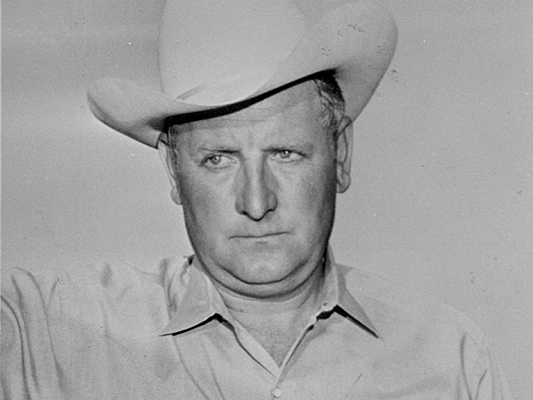Ralph Lamb

Born: April 9, 1927, Alamo, Nevada
Died: July 3, 2015, Las Vegas, Nevada
Nicknames: Cowboy Sheriff
Associations: Clark County Sheriff, Las Vegas Metropolitan Police Department
Ralph Lamb put his stamp – and his cowboy boot – on Las Vegas at a time when the Mob was rapidly moving into the desert community with men and money, including millions borrowed from union pension funds.
His uneasy relationships with the mobsters is emblematic, perhaps, of the relationship Las Vegas had with the Mob – the money was welcome, and helped grow Las Vegas from a whistlestop to an international resort destination, but with the Mob came violence, corruption and a reputation that lingers to this day.
Lamb was sheriff from 1961 to 1979, a period of explosive growth in metropolitan Las Vegas and especially the unincorporated area south of the city known as the Strip. It was a time when the Mob was investing in new properties on the Strip, especially the resort known as the Stardust (famously fictionalized in the 1995 movie Casino). The relationship between Lamb and the Mob has inspired several works of fiction, including a short-lived television series, Vegas, in 2012.
Lamb’s service in Las Vegas began after he served in Army Intelligence in the Pacific theater of World War II. Lamb moved to Las Vegas and worked as a deputy sheriff, rising to become chief of detectives for the sheriff’s department. For several years, Lamb had a private detective agency and counted among his clients the aviator and businessman Howard Hughes.
Lamb ran, unsuccessfully, for sheriff in 1958; however, he was appointed sheriff in 1961, ran for election in 1962 and served 18 years in total.
Lamb worked with the FBI to build a file of the mobsters that he and others suspected were moving into the desert town.
At one point, Lamb grabbed Johnny Rosselli, a man with known connections to the Chicago Outfit who had enormous juice in running the Stardust and other enterprises in Las Vegas. In the physical confrontation that followed, Rosselli got the worst of it: one newspaper account says Lamb “slapped the cologne” off “Handsome Johnny.”
Lamb had little direct trouble with mobsters after his go-round with Rosselli. Others also learned the hard way that Lamb wasn’t to be messed with.
Once, in the mid-1960s, Lamb reportedly greeted a rolling herd of Hell’s Angels by first destroying some of their motorcycles, then giving the men haircuts.
Despite tales of Old West tactics, Lamb was credited with bringing modern investigative techniques to Las Vegas’ growing police force. He also oversaw the unification of the Las Vegas City Police and Clark County Sheriff’s Department in 1973, a move that helped streamline and professionalize the combined department.
There were rough patches for Lamb. In 1977, he was indicted by the IRS for income tax evasion. The federal agency argued that loans, including $30,000 from casino operator Benny Binion, were not meant to be repaid and thus were undeclared income. A federal judge ruled that building materials Lamb used for his ranch were gifts, and not subject to income tax, and that the government failed to prove he did not have to repay the Binion loan. The sheriff was acquitted on all charges.
But the charges hurt him politically. Despite his continuing popularity, especially with longtime Las Vegas residents, Lamb was voted out of office in 1978.
The next decade would see Metro Police, state gaming investigators and federal agents chip away at the Mob’s presence in Southern Nevada.
In 1983, Floyd Lamb, a state senator, was convicted of taking a $23,000 bribe in an FBI sting, but his younger brother was not implicated in any way.




